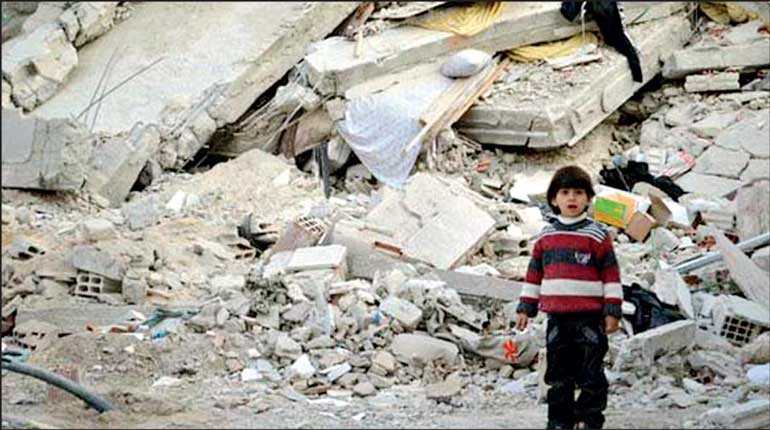Saturday Feb 28, 2026
Saturday Feb 28, 2026
Saturday, 28 November 2020 00:04 - - {{hitsCtrl.values.hits}}

For decades the world has been helplessly watching the Palestinian tragedy unfold as the people of this land are being driven out of their homes that are being destroyed
 The 29th of November has been named as the International Day of Solidarity with the Palestinian people by the United Nations.
The 29th of November has been named as the International Day of Solidarity with the Palestinian people by the United Nations.
In drawing attention to the struggle of the Palestinian people we cannot but remember the firm stand that the United Nations took against racism, against the evil of Apartheid and supported the liberation struggle of the people of South Africa.
At the time his people were liberated, the celebrated leader of the liberation struggle for South Africa Nelson Mandela made a profound statement, which resonates around the world to this day.
He said: “For many years the United Nations stood firm against racism. Because of that a worldwide consensus was built against this unfair system. We know too well that our freedom is incomplete without the freedom of the Palestinians.”
The Palestinian conflict is a complex one and it is a mistake for us to make judgements by viewing it on the surface with pre-conceived notions. Instead, I urge everyone to understand the underlying deep reasons why the Palestinian conflict has not been resolved after all these years. We have to take a humane view of their issues, their status and problems, and understand the realities. In short, we need to address these issues in a correct and just manner.
The Palestinian struggle has gone on for seven long decades and we are disturbed to note that currently moves are afoot so that the Palestinians will lose their motherland forever.
The world has failed to implement the international consensus sought by the United Nations to find a fair and just solution to the Palestinian issue because the Superpowers in the United Nations Security Council have used their veto powers to stop important UN Resolutions aimed at actualising the broader view of the majority of the countries around the world. It is with sadness that we observe that the UN has been powerless to do the right thing for the Palestinians.
At this time, I remember the statement made by President Barack Obama, who lit up the hopes of all those who sought a solution to the Palestinian issue when he made the famous ‘Cairo declaration’.
In that statement he said: “It is also undeniable that the Palestinian people – Muslims and Christians – have suffered in pursuit of a homeland. For more than 60 years they’ve endured the pain of dislocation. Many wait in refugee camps in the West Bank, Gaza, and neighbouring lands for a life of peace and security that they have never been able to lead. They endure the daily humiliations – large and small – that come with occupation. So let there be no doubt: The situation for the Palestinian people is intolerable. And America will not turn our backs on the legitimate Palestinian aspiration for dignity, opportunity, and a state of their own.”
Little has happened since and unfortunately we have to add Obama to the list of US Presidents who have historically been unable to fulfil its promise to provide a just solution to the Palestinian question.
President Bush also asked once: “Why do these people hate us so much?”
It is also said that a US President who was there before Bush, Eisenhower, in a discussion with his staff asked the same question: “Why does the Arab world look at us in such a wrong way?”
Actually, the question arises not from the governments but from the ordinary people of the Arab world. The people rightly accuse the United States of safeguarding corrupt and autocratic regimes in the Middle East preventing the dawn of democracy in the region. The actual actions of the United States in the Middle East are contrary to its claim of being the ‘watchdog of democracy’ in the region.
The initiatives made by Washington to bring peace to the Palestinians from the Camp David Accords to the Oslo Accords have been rendered useless by Israel.
In January 1976 the United Nations, backed by a wide global consensus, passed a Resolution granting Palestine political sovereignty. This Resolution received the support of the Palestine Liberation Organisation, the Arab countries, the European Bloc and the Soviet Bloc. However, this UN effort was also stopped by the exercise of a veto from the United States. The 1981 initiative from Saudi Arabia called the FAHAD peace deal was also rejected by Israel.
For decades the world has been helplessly watching the Palestinian tragedy unfold as the people of this land are being driven out of their homes that are being destroyed. They are forced to wander as they are constantly harassed and deprived of the very basic necessities such as water. They have no freedom of movement, as they are being arrested arbitrarily, even little children and women have been detained.
In the year 2020 alone 684 homes and other buildings in the West Bank were completely destroyed by Israelis.
In October 2000, the UN Security Council resolved with a 14 to 0 vote that Israel should act according to the obligations and agreements contained in the Fourth Geneva Convention and return all Palestinian lands that have been occupied. At that time the US abstained from voting.
In addition, in 2001 when Israeli troops clashed with Palestinians, attempts by the United Nations to send in international observers to minimise violence under the so-called Michael plan was opposed by Israel and the United States.
These actions of the US have damaged its credentials as a neutral player in resolving issues in the Middle East and has ruined its reputation as a champion of democracy and global justice.
Under President Donald Trump the US Middle East policy has been very one-sided. However, under the new Democratic President it is hoped that the policy towards this region will be fairer and more progressive. If that does not happen then it will be a big blow against America’s boast of being a country that is a proponent of peace and democracy across the world.
I will conclude with this quote from former President of the US Jimmy Carter: “The bottom line is this: Peace will come to Israel and the Middle East only when the Israeli government is willing to comply with international law, with the Roadmap for Peace, with official American policy, with the wishes of a majority of its own citizens – and honour its own previous commitments – by accepting its legal borders. All Arab neighbours must pledge to honour Israel’s right to live in peace under these conditions. The United States is squandering international prestige and goodwill and intensifying global anti-American terrorism by unofficially condoning or abetting the Israeli confiscation and colonisation of Palestinian territories.”
President Carter’s words ring true even today. The soil of the Middle-East continues to be spattered with the blood of Jews, Christians and Muslims all considered as the children of Abraham. This bloodshed caused by political and economic motives must end.
We wish all the peoples in the region a secure peace, in which they may live with dignity and mutual respect.
(The writer is a Member of Parliament and Co-chairman Sri Lanka-Palestine Solidarity Committee.)